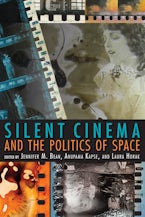- Home
- New Directions in National Cinemas
- Theorizing Colonial Cinema
Preparing your PDF for download...
There was a problem with your download, please contact the server administrator.
Theorizing Colonial Cinema
Reframing Production, Circulation, and Consumption of Film in Asia
Edited by Nayoung Aimee Kwon, Takushi Odagiri and Moonim Baek
Contributions by Nadine Chan, Aaron Gerow, Jane Marie Gaines, Zhen Zhang, Thomas A. C. Barker, Nikki J. Y. Lee, José B. Capino and Yiman Wang
Published by: Indiana University Press
306 Pages, 34 b&w photos
- eBook
- 9780253059772
- Published: February 2022
$24.99
Other Retailers:
Theorizing Colonial Cinema is a millennial retrospective on the entangled intimacy between film and colonialism from film's global inception to contemporary legacies in and of Asia.
The volume engages new perspectives by asking how prior discussions on film form, theory, history, and ideology may be challenged by centering the colonial question rather than relegating it to the periphery. To that end, contributors begin by excavating little-known archives and perspectives from the colonies as a departure from a prevailing focus on Europe's imperial histories and archives about the colonies. The collection pinpoints various forms of devaluation and misrecognition both in and beyond the region that continue to relegate local voices to the margins.
This pathbreaking study on global film history advances prior scholarship by bringing together an array of established and new interdisciplinary voices from film studies, Asian studies, and postcolonial studies to consider how the present is continually haunted by the colonial past.
Winner of the SCMS Best Edited Collection Award!
Acknowledgments
On Romanization, Naming and Translation
Introduction, by Nayoung Aimee Kwon and Takushi Odagiri
Part I: "Time and Racialized Other: Colonial Modernity and Early Cinema"
1. Time, Race, and the Asynchronous in the Colonial Documentaries of Malaya, by Nadine Chan
2. Facing Malcontent Colonial Korean Comrades: A Typology of Colonial Cinema in Asia's Socialist Alliances, by Moonim Baek
3. Colonial-Era Film Theory, Spectatorship, and the Problem of Internalization, by Aaron Gerow
4. Chinese Cinema's Other: Wrangling over "China-humiliating" Films (ruHua pian), by Yiman Wang
5. World Export: Melodramas of Colonial Conquest, by Jane Marie Gaines
Part II: "Divided Mis-en-Scène: Colonial Cinema and Cold War Afterimages"
6. Tarzan/Taishan and Other Orphans: Taiwan's Melodrama of Decolonization, by Zhang Zhen
7. What Is an Auteur? Hŏ Yŏng/Hinatsu Eitarō/Huyung Between (Post)Colonial Indonesia, Japan, and Korea, by Thomas A. C. Barker and Nikki J. Y. Lee
Part III: "Millennial Hauntings: Rising Global Asian Cinemas"
8. Cinema's Coloniality, by Takushi Odagiri
9. A Hallucinatory History of the Philippine-American War: Khavn's Balangiga: Howling Wilderness, by José B. Capino
10. Millennial Vengeance: Park Chan-Wook's Agassi (The Handmaiden) and the Return of Postcolonial Japonisme, by Nayoung Aimee Kwon
Index
Nayoung Aimee Kwon is Associate Professor in the Department of Asian and Middle Eastern Studies and Program in Cinematic Arts at Duke University. She is the Founding Director of Duke's Asian American and Diaspora Studies Program and Co-director of the Andrew Mellon Games and Culture Humanities Lab. Her most recent monograph is Intimate Empire. Takushi Odagiri is Associate Professor of Ethics and Philosophy in the Institute of Liberal Arts and Science and in the School of Social Innovation Studies at Kanazawa University. His publications appear in positions: asia critique, boundary 2, Journal of Religion, and Tetsugaku, among other venues. Moonim Baek is Professor of Korean Language amd Literature at Yonsei University. She is the author of Chum A-ut: Hankuk Yŏnghwa ŭi Chŏngch'ihak (Zoom-Out: Politics of Korean Cinema), Hyŏngŏn: Munhakkwa yŏnghwa ŭi wŏnkŭnpŏp (Figural Images: Perspectives on Literature and Film), Wŏlha ŭi Yŏkoksŏng: Yŏkwiro Ponŭn Hankuk Kongpoyŏnghwasa (Scream under the Moon: Korean Horror Film History through Female Ghosts), and Im Hwa ŭi Yŏnghwa (Im Hwa's Cinema).
"With this excellent anthology, the history of colonization finally receives the full reckoning it deserves in articulations of film history and theory. By accounting for the legacies, stages, stagings, and afterlives of imperialism writ large and small in cinemas of or about Asia, the authors of this collection teach us how profoundly our historical and conceptual understanding of film transforms when we begin from the time and place of the colony. This is a ground shift that can no longer be ignored."
~Priya Jaikumar, author of Where Histories Reside: India as Filmed Space
"There was a time when writing about cinema was mostly about cinema from Western European countries and the US, spoken in one of the six European languages of Western modernity. No longer. Storytelling in moving images and non-Western languages carries within them praxes of living rooted in colonial legacies absent in the hegemonic history of Western cinematography. Theorizing Colonial Cinema is written by a majority of scholars that inhabits and endures colonial legacies and are embedded in the soundtrack languages of these moving images. This book is a landmark that complements and surpasses Third Cinema's heritage of the '60s and '70s. "
~Walter D. Mignolo, author of The Politis of Decolonial Investigations
"A brilliant intervention into history, film, and cultural studies that goes far beyond the national cinema rubric and conventional binaries such as colonizer/colonized, white/non-white, East/West, anthropos/humanitas, theory/text, human/animal – this work by leading scholars of colonialism and film excavates cultural production and its political unconscious under colonialism to show not only the entanglements of colonialism and film but also the coloniality of cinema itself and the inevitable return of the repressed through the Cold War and postmillennial moments. A major work that will make many waves across disciplines and areas of specialization."
~Takashi Fujitani, author of Race for Empire, University of Toronto
- SCMS Best Edited Collection Award


